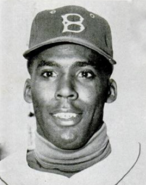
Sanford Koufax, nicknamed "the Left Arm of God", is an American former baseball pitcher who played 12 seasons in Major League Baseball (MLB) for the Brooklyn/Los Angeles Dodgers from 1955 to 1966. Widely regarded as one of the greatest pitchers in baseball history, Koufax was the first three-time winner of the Cy Young Award, each time winning unanimously and the only pitcher to do so when a single award was given for both the leagues; he was also named the National League Most Valuable Player in 1963. Retiring at the age of 30 due to chronic pain in his pitching elbow, Koufax was elected to the Baseball Hall of Fame in his first year of eligibility in 1972 at the age of 36, the youngest player ever elected.
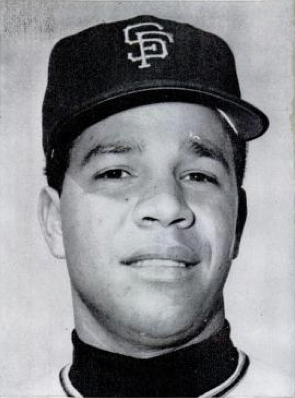
Juan Antonio Marichal Sánchez, nicknamed "the Dominican Dandy", is a Dominican former right-handed pitcher who played 16 seasons in Major League Baseball from 1960 to 1975, mostly with the San Francisco Giants. Known for his high leg kick, variety of pitches, arm angles and deliveries, pinpoint control, and durability, Marichal won 18 games to help the Giants reach the 1962 World Series, and went on to earn 191 victories in the 1960s, the most of any major league pitcher. He won over 20 games six times, on each occasion posting an earned run average (ERA) below 2.50 and striking out more than 200 batters, and became the first right-hander since Bob Feller to win 25 games three times; his 26 wins in 1968 remain a franchise record.

John Junior Roseboro was an American professional baseball player and coach. He played as a catcher in Major League Baseball from 1957 until 1970, most prominently as a member of the Los Angeles Dodgers. A four-time All-Star player, Roseboro is considered one of the best defensive catchers of the 1960s, winning two Gold Glove Awards. He was the Dodgers' starting catcher in four World Series with the Dodgers winning three of those.
The 1966 World Series was the championship series of Major League Baseball's (MLB) 1966 season. The 63rd edition of the World Series, it was a best-of-seven playoff between the American League (AL) champion Baltimore Orioles and National League (NL) champion Los Angeles Dodgers. The Orioles swept the series in four games to capture their first championship in franchise history. It was the last World Series played before MLB introduced the Commissioner's Trophy the following year. The Dodgers suffered record low scoring, accumulating just two runs over the course of the series, the lowest number of runs ever scored by any team in a World Series.
The 1965 World Series was the championship series of Major League Baseball's (MLB) 1965 season. The 62nd edition of the World Series, it was a best-of-seven playoff that matched the National League champion Los Angeles Dodgers against the American League champion Minnesota Twins. The Dodgers won in seven games.

The Dodgers–Giants rivalry is regarded as one of the fiercest and longest-standing rivalries in American baseball, with some observers considering it the greatest sports rivalry of all time. It dates back to the late 19th century, when both clubs were based in New York City.
The following are the baseball events of the year 1966 throughout the world.
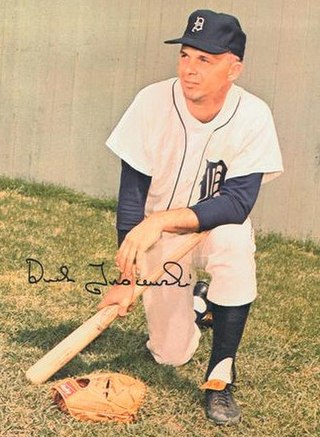
Richard Joseph Tracewski, nicknamed "Trixie", is an American former baseball player, coach, and manager. During his playing career, he was an infielder for the Los Angeles Dodgers and Detroit Tigers of Major League Baseball, appearing in 614 games over eight seasons, from 1962 to 1969.

On September 9, 1965, Sandy Koufax of the Los Angeles Dodgers pitched a perfect game in the National League against the Chicago Cubs at Dodger Stadium.
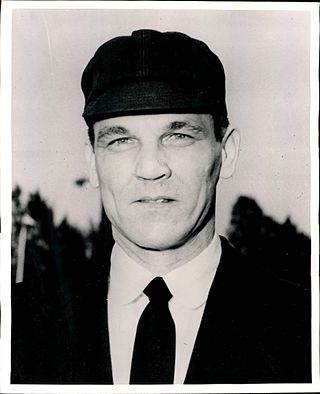
Henry Charles "Shag" Crawford was an American professional umpire in Major League Baseball who worked in the National League from 1956 to 1975. During his twenty seasons in the National League, Crawford worked more than 3,100 games and as a home plate umpire was notable for getting in a low crouch and resting his hands on the back of the catcher in front of him. Crawford wore number 2 after the National League adopted numbers for its umpires, which was then transferred to his son Jerry Crawford, who wore it from 1976 until his 2010 retirement.
The 1966 Los Angeles Dodgers won the National League championship with a 95–67 record, but were swept by the Baltimore Orioles in the World Series.
The 1962 Los Angeles Dodgers season was the fifth for the team in Southern California, and the 73rd for the franchise in the National League. After spending the previous four seasons at the Los Angeles Memorial Coliseum, they began the season by opening Dodger Stadium, the team's new ballpark. The stadium opened on April 10 with a game against the Cincinnati Reds. The Dodgers proceeded to win a Los Angeles record 102 games and tied the San Francisco Giants for first place in the National League. The Giants won the ensuing tie-breaker series two games to one.

Douglas Joseph Camilli is an American former catcher and coach who played in Major League Baseball from 1960 to 1967 and in 1969 for the Los Angeles Dodgers and Washington Senators. Camilli threw and batted right-handed, stood 5 feet 11 inches (1.80 m) tall and weighed 195 pounds (88 kg) during his active career.
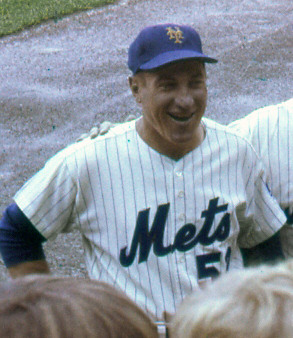
Joseph Benjamin Pignatano was an American professional baseball player and coach. As a catcher, Pignatano played in Major League Baseball during all or part of six seasons (1957–1962) for the Brooklyn / Los Angeles Dodgers (1957–1960), Kansas City Athletics (1961), San Francisco Giants (1962), and New York Mets (1962). After his playing career, he was a coach for the Mets, Washington Senators, and Atlanta Braves.
The 1962 San Francisco Giants season was the Giants' 80th year in Major League Baseball, their fifth year in San Francisco since their move from New York following the 1957 season, and their third at Candlestick Park. The team finished in first place in the National League with a record of 103 wins and 62 losses. They finished the season tied with their arch-rivals, the Los Angeles Dodgers, for first place in the league, necessitating a three-game tiebreaker playoff to determine the pennant winner. The Giants won two of the three games to take their first National League title since moving to San Francisco, making the Giants the first NL Champions of the 162-game schedule era. They went on to the 1962 World Series, where they lost in seven games to the New York Yankees. The Giants had 1,552 hits in the regular season, the most in the club's San Francisco era.
The 1965 San Francisco Giants season was the Giants' 83rd year in Major League Baseball, their eighth year in San Francisco since their move from New York following the 1957 season, and their sixth at Candlestick Park. The team finished in second place in the National League with a 95–67 record, 2 games behind the Los Angeles Dodgers.
The 1963 Major League Baseball season was contested from April 8 to October 6, 1963. The American League and National League both featured ten teams, with each team playing a 162-game schedule.
The 1965 Major League Baseball season was contested from April 12 to October 14, 1965. The Los Angeles Dodgers and Minnesota Twins were the regular season champions of the National League and American League, respectively. The Dodgers then defeated the Twins in the World Series, four games to three.
The 1962 National League tie-breaker series was a best-of-three playoff series that extended Major League Baseball's (MLB) 1962 regular season to determine the winner of the National League (NL) pennant. The games were played from October 1 to 3, 1962, between the Los Angeles Dodgers and the San Francisco Giants. The Giants won the series, two games to one. The first game took place at Candlestick Park and the second and third were played at Dodger Stadium. The tie-breaker series was necessary after both teams finished the season with identical win–loss records of 101–61. The Dodgers won a coin flip late in the season, which gave them home field advantage. The series was broadcast nationally by NBC television, with Bob Wolff, George Kell, and Joe Garagiola announcing, and NBC Radio, with Al Helfer and George Kell announcing.
The 1959 National League tie-breaker series was a best-of-three playoff series that extended Major League Baseball's (MLB) 1959 regular season to decide the winner of the National League (NL) pennant. The tiebreaker series was necessary after the Los Angeles Dodgers and Milwaukee Braves finished the season with identical win–loss records of 86–68 (.558) on Sunday, September 27, three games ahead of the San Francisco Giants. It was the first tie-breaker in the majors in eight years, also in the National League.
